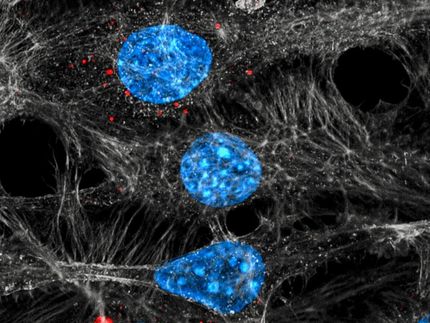EUR 1.0 Million Grant Awarded to Exosome Diagnostics and Ludwig Maximilian University from German Federal Ministry for Education and Research to Develop Biofluid-Derived Exosome Diagnostics
Advertisement
Exosome Diagnostics GmbH, a subsidiary of Exosome Diagnostics, Inc., and the Department of Dermatology at the Ludwig Maximilian University (LMU) announces the awarding of a EUR one million grant from the German Federal Ministry for Education and Research (BMBF) to develop blood-based diagnostic tests from the stable RNA content accessible in plasma-derived exosomes. The grant will help fund development of exosome-based diagnostics technology to detect tumor specific mutations in the blood from patients with malignant cancer in order to enable monitoring of disease recurrence, aid therapy selection and possibly improve early tumor detection. The grant was awarded under the Leading-Edge Cluster program "m4 – Personalized Medicine and Targeted Therapies."
Cancer tumor-specific somatic mutations such as those found in the RAF and RAS gene families will be investigated by coupling exosome-based technology with next-generation sequencing and qPCR instrument platforms. Exosome Diagnostics GmbH intends to offer clinical diagnostic tests developed under this project as a commercial laboratory service performed out of the Company's St. Paul, Minnesota, United States and Munich, Germany, cGLP laboratories.
"Exosome technology allows us to repeatedly interrogate tumor, inflammatory and immune response gene signatures in a minimally invasive manner," said James McCullough, chief executive officer, Exosome Diagnostics. "We are essentially looking for genetic needles in a haystack of biological material. By isolating exosomes we avoid a host of complicating factors, such as circulating enzymes, platelets, and other interfering factors, that are a significant detriment to achieving diagnostic sensitivity and reproducibility."
Microvesicles, of which exosomes are a subset, contain large quantities of tumor-derived messenger RNA (mRNA) found in biofluids outside of tumor cells. Microvesicle mRNA, is of high quality and includes both small and large RNA molecules in multiple copies. The microvesicle/exosome population provides a stable source of RNA in blood, urine and CSF that, when isolated and prepared properly, can produce high diagnostic sensitivity for key gene mutations and gene expression levels.
Exosome RNA biofluid diagnostic tests have potentially significant implications for disease identification, treatment and monitoring. In many cases, tumor tissue is difficult to attain and requires either a biopsy or a surgical procedure. Repeated blood and urine measurements are minimally invasive and can provide critical information on a tumor's genetic status over time, through the course of treatment and recurrence.



























































